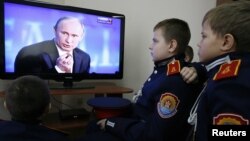MOSCOW —
Russian President Vladimir Putin touched on many topics in his end-of-year address, including U.S.-Russian relations, the conflict in Syria and his health. One topic, however, seemed to garner particular attention from the Russian leader - a law passed by Washington that punishes Russians who abuse human rights.
In his speech, Putin expressed anger over the U.S. Congress' recent passage of the so-called Magnitsky Act. The legislation requires Washington to freeze the assets of and bar entry to anyone who was allegedly involved in the 2009 death of Russian anti-corruption lawyer Sergei Magnitsky.
Magnitsky worked for Russia’s largest Western investment fund and claimed to have uncovered a scheme used by Russian officials to embezzle more than $230 million in taxes paid by that firm. He was later arrested by the same officials he had accused of the tax fraud. He died in prison awaiting trial on corruption charges.
Putin says the Magnitsky Act is not good for U.S.-Russia relations.
He says the bill is unfriendly towards Russia and that Washington is trying to remain in the past. He goes on to say that the measure is "very bad" and is poisoning relations between Russia and the United States.
The Kremlin has responded in kind to the Magnitsky Act. The State Duma, the country’s lower house of parliament, has overwhelmingly passed an adoption amendment that would bar Americans from adopting Russian children.
Putin says the measure was an adequate response because America is not taking care of the children it adopts from Russia.
He says that when crimes are committed against adopted Russian children, America’s judiciary most often does not react to this at all and does not bring criminal charges against people who clearly committed a crime against a child.
The adoption amendment must pass a third reading in the Duma and clear the upper house before it goes to Putin for his signature and becomes law.
Meanwhile, also in response to the Magnitsky Act, Russia has given initial approval to a law that would penalize Americans accused of violating the human rights of Russian citizens abroad. Those blacklisted would be banned from entering Russia and would be subject to asset freezes.
In his speech, Putin also addressed the civil war in Syria, saying that any solution to the conflict there must ensure that President Bashar al-Assad’s government and the Syrian opposition do not simply swap positions and the fighting continues without end.
For the first time, the president appeared to acknowledge a future Syrian government without Assad. Russia has been a long-time ally of Syria and a major arms seller to the country. Moscow continues to maintain a naval base there.
The Kremlin has also refused to back three rounds of sanctions against the Assad government, saying dialogue with both sides is necessary for peace. Putin has also consistently maintained that it is not the job of the United Nations Security Council to promote regime change.
The Russian leader also addressed press reports that his back has been hurting him, saying he is in perfect health.




